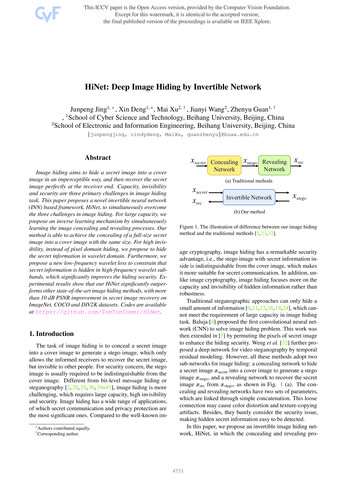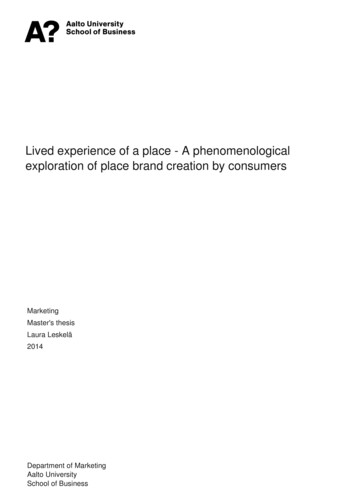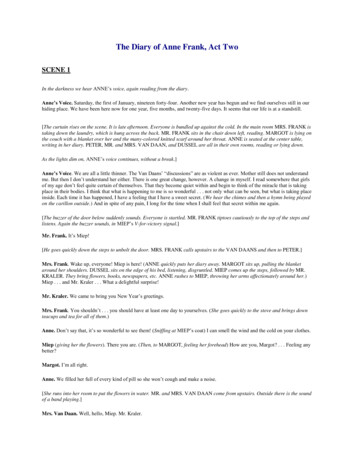
Transcription
“I will never forget the first time I read The Hiding Place. My heart was riveted by the fact that thelove of God is the greatest power of them all. Today the truth remains the same, and I pray we arechallenged and inspired again by Corrie ten Boom’s powerful story of faith, triumph, andunconditional love.”Darlene Zschech, worship leaderand songwriter“One of the most remarkable stories of one of the most remarkable women I’ve known. Irecommend it most enthusiastically.”Chuck Colson, founder and chairman,Prison Fellowship“The Hiding Place is a classic that begs revisiting. Corrie ten Boom lived the deeper life withGod, exchanging love and forgiveness for hatred and cruelty, trusting God in the midst of fear,horror, and uncertainty. This gripping story of love in action will challenge and inspire you!”Joyce Meyer, best-selling authorand Bible teacher“Ten Boom’s classic is even more relevant to the present hour than at the time of its writing. Notonly do we need to be inspired afresh by the courage manifested by her family, but we are atanother watershed moment in the history of global anti-Semitism, and we need a strong reminder ofGod’s timeless covenant with His ancient people and of our obligation as believers to stand withthem as Corrie’s family did in their generation.”Jack W. Hayford, president, InternationalFoursquare Church; chancellor,The King’s College and Seminary“The Hiding Place is the heart-wrenching, powerfully inspiring story of the triumph of God’s loveand forgiveness in the heart of Nazi concentration camp survivor Corrie ten Boom. Beautifullypenned by Elizabeth and John Sherrill, it will always sit on the top shelf of Christian classics.”Peter Marshall, author, The Light and theGlory and From Sea to Shining Sea“A groundbreaking book that shines a clear light on one of the darkest moments of history.”Philip Yancey, author ofWhat’s So Amazing About Grace?and The Jesus I Never Knew“In Corrie ten Boom, self was visibly crucified, and her sacrifices and genuine merciesdemonstrated themselves to the convictions of men in every nation and tongue. Her disinterest inthe spirit of this age convinced even the heathen. She truly manifested the spirit of Christianity.”David Wilkerson, founding pastor,Times Square Church;founder, Teen Challenge“Corrie ten Boom’s spiritual beauty echoes throughout the story of The Hiding Place. Valor,determination, and integrity manifest themselves in her inspiring life and in her courageous actions.She is one of the few who can be described as a true hero.”David Selby, international director,
Derek Prince Ministries
Corrie with an early edition of The Hiding Place.
TheHIDINGPLACE35THANNIVERSARYEDITIONCORRIE TEN BOOMwith ELIZABETH & JOHN SHERRILL
1971 and 1984 by Corrie ten Boomand Elizabeth and John Sherrill 2006 by Elizabeth and John SherrillPublished by Chosen Booksa division of Baker Publishing GroupP.O. Box 6287, Grand Rapids, MI 49516-6287chosenbooks.comE-book edition created 2011All rights reserved. No part of this publication may be reproduced, stored in a retrieval system, or transmitted in any form or by anymeans—for example, electronic, photocopy, recording—without the prior written permission of the publisher. The only exception is briefquotations in printed reviews.Library of Congress Catalog Card Number 73-172389ISBN 978-1-4412-3288-5Library of Congress Cataloging-in-Publication Data is on file at the Library of Congress, Washington, DC.Scripture is taken from the King James Version of the Bible. The ten Boom family read the Bible in Dutch, and later, when Corrie andBetsie read it aloud in Bible studies, they translated it for their audience. The KJV is, therefore, an approximate translation.Material contained in “Since Then” is reprinted with permission from Guideposts magazine. Copyright 1983 by GuidepostsAssociates, Inc., Carmel, NY 10512.
ContentsForewordPrefaceIntroduction1. The One Hundredth Birthday Party2. Full Table3. Karel4. The Watch Shop5. Invasion6. The Secret Room7. Eusie8. Storm Clouds Gather9. The Raid10. Scheveningen11. The Lieutenant12. Vught13. Ravensbruck14. The Blue Sweater15. The Three VisionsSince ThenAppendix
Forewordthe strangest of times.It wasWe wore tie-dyed shirts, listened to Jimi Hendrix, and watched the Vietnam War over TVdinners. Well, not everybody did that. I was not into shirts that made me dizzy, I hated psychedelicmusic, and I turned the channel whenever the war came on. I had more important things on mymind. Like surviving.The year 1971 marked four years in a wheelchair for me. Although my diving accident was inthe past, the quadriplegia was not. I was still a little shaky living with total and permanentparalysis, plus I was still struggling to understand how God was going to use it for my good. It didnot help that the world around me was unraveling at the seams.Somewhere in the mayhem, a friend gave me a copy of The Hiding Place. The back coverexplained that it was about the life of Corrie ten Boom, a survivor of Nazi death camps. I wasintrigued. As I said, I was into surviving. Perhaps this gutsy, gray-haired woman wearing a coatlike the old raccoon thing in my mother’s closet would have something to say to me.The first chapter had me hooked. Although Corrie was from a different era, her life reachedacross the decades. World War II was far different from my own holocaust, but her ability to lookstraight into the terrifying jaws of a gas-chambered hell and walk out courageously into thesunshine of the other side was—well, just the story I needed to hear.For years to come, when I would occasionally fall back into my own pit of fear or depression,the Spirit of God would tenderly bring to mind her well-known phrases: “There is no pit so deepthat God’s love is not deeper still.” “Only heaven will reveal the top side of God’s tapestry.” And,probably the most poignant and powerful of all, simply “Jesus is Victor.”You can understand why, when I first met Corrie ten Boom, I was filled with glee. She graspedmy shoulder firmly and announced in her thick Dutch accent, “Oh, Joni, it will be a grand day whenwe will dance together in heaven!” The image she painted of us skipping down streets of gold leftme breathless. I could easily picture the scene of glory and gladness. It made me realize I hadsurvived.From then on, the years flew. Corrie continued to write books, travel to countless countries, andeven oversee the film they made of The Hiding Place. But time was catching up with her, and afterseveral strokes, her tired body finally gave out. When I attended her funeral—a quiet ceremonywith testimonies and tulips—I kept thinking of that moment we first met. I smiled to imagine thatheaven was applauding and that Jesus was probably explaining to her His choice of strange, darkthreads mixed among the gold in the tapestry of which she so often spoke.That was 1983. The years have continued to march on and, sadly, things are no less crazy. Whatfew seams are holding the planet together are strained and threadbare, like so many peoplewondering how to survive in a world that even dear Corrie would barely recognize.I take that back. She would recognize it. And she would know exactly what to do in the face ofnew wars whispering of global holocausts that threaten the survival of all mankind: she wouldfirmly yet gently point people to the Savior, reminding them that He is still Victor. She would
remind us all of the old, old story that Jesus has conquered sin, no matter how ugly and perniciousit gets. And that soon—perhaps sooner than we think—He will finally close the curtain on sin andsuffering, hate and holocausts to welcome home His survivors.One more thing. In the fall of 2004, as I was on a twenty-hour flight to India, the decades finallycaught up with me. I was in great pain, sitting on quadriplegic bones that were thin and tired. Topass the hours, and to keep discomfort at bay, I started reading another Corrie book, Life Lessonsfrom the Hiding Place. I got a lump in my throat as I read about her incredible passion to travel theworld to share the Gospel of Christ. At the age of 85, Corrie ten Boom was enduring flights likethis one . . . and if she could do it, by the grace of God, so can I! It was all the inspiration andencouragement I needed for the grueling journey. Once again Corrie ten Boom had spoken.Corrie’s story is as current and compelling as ever. This is why I am pleased and happy tocommend to you, part of a new generation of readers, this special edition of The Hiding Place. It isfor every person whose soul is threadbare and frazzled, and for every individual who must walkinto the jaws of his or her own suffering. And if you have gotten this far, it is for you. Go a littlefurther and you will discover what I did so long ago. . . .If God’s grace could sustain Corrie in that concentration camp, then His grace is sufficient foryou. With His help you can survive. And, Corrie would say, you will.Joni Eareckson TadaJoni and FriendsFall 2005
PrefaceMay 1968 I spent several days at a retreat center in Darmstadt, Germany. At a time when mostInGermanspreferred not to think about the Holocaust—or even denied outright that it had happened—a group of Lutheran women calling themselves the Sisters of Mary took on themselves the task ofrepentance for their nation. They assisted Jewish survivors, listened to their stories, and publicizedthe truth about the Nazi past.While at the center, I attended an evening service featuring two speakers. The first was a manwho had been a prisoner in a concentration camp. He had been brutalized and starved; his fatherand a brother had died in the camp. The man’s face and body told the story more eloquently thanhis words: pain-haunted eyes, shaking hands that could not forget.He was followed at the lectern by a white-haired woman, broad of frame and sensible of shoe,with a face that radiated love, peace, and joy. But the story that these two people related was thesame! She, too, had been in a concentration camp, experienced the same savagery, sufferedidentical losses. The man’s response was easy to understand. But hers?At the close of the service, I stayed behind to talk with her. Cornelia ten Boom, it was apparent,had found in a concentration camp, as the prophet Isaiah foretold, a “hiding place from the wind,and a covert from the tempest . . . the shadow of a great rock in a weary land” (Isaiah 32:2).With my husband, John, I returned to Europe to get to know this amazing woman. Together wevisited the crooked little Dutch house, one room wide, where until her fifties she lived theuneventful life of a spinster watchmaker—little dreaming as she cared for her older sister and theirelderly father that a world of high adventure and deadly danger lay just around the corner. We wentto the garden in southern Holland where young Corrie gave her heart away forever. To the bigbrick house in Haarlem where Pickwick served real coffee in the middle of the war.And all the while we had the extraordinary feeling that we were looking not into the past but intothe future. As though these people and places were speaking to us not about things that had alreadyhappened but about the experiences that lay ahead of us. Already we found ourselves putting intopractice what we learned from her about the following: handling separation getting along with less security in the midst of insecurity forgiveness how God can use weakness dealing with difficult people facing death loving your enemies what to do when evil winsWE COMMENTED to Corrie about the practicalness of the things she recalled, how her memoriesseemed to throw a spotlight on problems and decisions we faced here and now. “But,” she said,
“this is what the past is for! Every experience God gives us, every person He puts in our lives isthe perfect preparation for a future that only He can see.”Every experience, every person. . . . Father, who did the finest watch repairs in Holland and thenforgot to send the bill. Mama, whose body became a prison but whose spirit soared free. Betsie,who could make a party out of three potatoes and some twice-used tea leaves. As we looked intothe twinkling blue eyes of this undefeatable woman, we wished that these people had been part ofour own lives.And then, of course, we realized that they could be. . . .Elizabeth SherrillChappaqua, New YorkSeptember 2005
Introductionwho thinks Christianity is boring has not yet been introduced to my friend Corrie tenAnyoneBoom!One of the qualities I admired best about this remarkable lady was her zest for adventure.Although she was many years my senior, she traveled tirelessly with me behind the Iron Curtain,meeting with clandestine Christian cell groups in the days when this meant risking prison ordeportation.“They’re putting their lives on the line for what they believe,” she would say. “Why shouldn’tI?”If Corrie were alive today, I have no doubt she would insist on going with me to the current hotspots of persecution. And how she would delight in sharing her radical faith with bold believerslike the Christian Motorcycle Association, that wonderful group of men and women who oftendrive their bikes into poor countries, then give them away to pastors who have no other way to getaround.If you have never met Corrie ten Boom, the best way to enter into a lifetime friendship with herand her Lord is through the pages of this book. As The Hiding Place celebrates its 35thanniversary, a new generation is responding to her ringing challenge: “Come with me and step intothe greatest adventure you will ever know.”Brother Andrewfounder, Open Doorsauthor, God’s Smuggler
1The One Hundredth Birthday Partyjumped out of bed that morning with one question in my mind—sun or fog? Usually it was fog inJanuary in Holland, dank, chill, and gray. But occasionally—on a rare and magic day—a whitewinter sun broke through. I leaned as far as I could from the single window in my bedroom; it wasalways hard to see the sky from the Beje. Blank brick walls looked back at me, the backs of otherancient buildings in this crowded center of old Haarlem. But up there where my neck craned to see,above the crazy roofs and crooked chimneys, was a square of pale pearl sky. It was going to be asunny day for the party!I attempted a little waltz as I took my new dress from the tipsy old wardrobe against the wall.Father’s bedroom was directly under mine but at seventy-seven he slept soundly. That was oneadvantage to growing old, I thought, as I worked my arms into the sleeves and surveyed the effectin the mirror on the wardrobe door. Although some Dutch women in 1937 were wearing their skirtsknee-length, mine was still a cautious three inches above my shoes.You’re not growing younger yourself, I reminded my reflection. Maybe it was the new dressthat made me look more critically at myself than usual: 45 years old, unmarried, waistline longsince vanished.My sister Betsie, though seven years older than I, still had that slender grace that made peopleturn and look after her in the street. Heaven knows it wasn’t her clothes; our little watch shop hadnever made much money. But when Betsie put on a dress something wonderful happened to it.On me—until Betsie caught up with them—hems sagged, stockings tore, and collars twisted. Buttoday, I thought, standing back from the mirror as far as I could in the small room, the effect of darkmaroon was very smart.Far below me down on the street, the doorbell rang. Callers? Before 7:00 in the morning? Iopened my bedroom door and plunged down the steep twisting stairway. These stairs were anafterthought in this curious old house. Actually it was two houses. The one in front was a typicaltiny old-Haarlem structure, three stories high, two rooms deep, and only one room wide. At someunknown point in its long history, its rear wall had been knocked through to join it with the eventhinner, steeper house in back of it—which had only three rooms, one on top of the other—and thisnarrow corkscrew staircase squeezed between the two.Quick as I was, Betsie was at the door ahead of me. An enormous spray of flowers filled thedoorway. As Betsie took them, a small delivery boy appeared. “Nice day for the party, Miss,” hesaid, trying to peer past the flowers as though coffee and cake might already be set out. He wouldbe coming to the party later, as indeed, it seemed, would all of Haarlem.Betsie and I searched the bouquet for the card. “Pickwick!” we shouted together.Pickwick was an enormously wealthy customer who not only bought the very finest watches butoften came upstairs to the family part of the house above the shop. His real name was HermanSluring; Pickwick was the name Betsie and I used between ourselves because he looked soincredibly like the illustrator’s drawing in our copy of Dickens. Herman Sluring was without doubtI
the ugliest man in Haarlem. Short, immensely fat, head bald as a Holland cheese, he was so walleyed that you were never quite sure whether he was looking at you or someone else—and as kindand generous as he was fearsome to look at.The flowers had come to the side door, the door the family used, opening onto a tiny alleyway,and Betsie and I carried them from the little hall into the shop. First was the workroom wherewatches and clocks were repaired. There was the high bench over which Father had bent for somany years, doing the delicate, painstaking work that was known as the finest in Holland. Andthere in the center of the room was my bench, and next to mine Hans the apprentice’s, and againstthe wall old Christoffels’.Beyond the workroom was the customers’ part of the shop with its glass case full of watches.All the wall clocks were striking 7:00 as Betsie and I carried the flowers in and looked for themost artistic spot to put them. Ever since childhood I had loved to step into this room where ahundred ticking voices welcomed me. It was still dark inside because the shutters had not beendrawn back from the windows on the street. I unlocked the street door and stepped out into theBarteljorisstraat. The other shops up and down the narrow street were shuttered and silent: theoptician’s next door, the dress shop, the baker’s, Weil’s Furriers across the street.I folded back our shutters and stood for a minute admiring the window display that Betsie and Ihad at last agreed upon. This window was always a great source of debate between us, I wanting todisplay as much of our stock as could be squeezed onto the shelf, and Betsie maintaining that twoor three beautiful watches, with perhaps a piece of silk or satin swirled beneath, was more elegantand more inviting. But this time the window satisfied us both: it held a collection of clocks andpocketwatches all at least a hundred years old, borrowed for the occasion from friends and antiquedealers all over the city. For today was the shop’s one hundredth birthday. It was on this day inJanuary 1837 that Father’s father had placed in this window a sign: ten boom. watches.For the last ten minutes, with a heavenly disregard for the precisions of passing time, the churchbells of Haarlem had been pealing out 7:00 and now half a block away in the town square, thegreat bell of St. Bavo’s solemnly donged seven times. I lingered in the street to count them, thoughit was cold in the January dawn. Of course everyone in Haarlem had radios now, but I couldremember when the life of the city had run on St. Bavo time, and only trainmen and others whoneeded to know the exact hour had come here to read the “astronomical clock.” Father would takethe train to Amsterdam each week to bring back the time from the Naval Observatory and it was asource of pride to him that the astronomical clock was never more than two seconds off in theseven days. There it stood now, as I stepped back into the shop, still tall and gleaming on itsconcrete block, but shorn now of eminence.The doorbell on the alley was ringing again; more flowers. So it went for an hour, largebouquets and small ones, elaborate set pieces and home-grown plants in clay pots. For although theparty was for the shop, the affection of the city was for Father. “Haarlem’s Grand Old Man” theycalled him and they were setting about to prove it. When the shop and the workroom would nothold another bouquet, Betsie and I started carrying them upstairs to the two rooms above the shop.Though it was twenty years since her death, these were still “Tante Jans’s rooms.” Tante Jans wasMother’s older sister and her presence lingered in the massive dark furniture she had left behindher. Betsie set down a pot of greenhouse-grown tulips and stepped back with a little cry of
pleasure.“Corrie, just look how much brighter!”Poor Betsie. The Beje was so closed in by the houses around that the window plants she startedeach spring never grew tall enough to bloom.At 7:45 Hans, the apprentice, arrived and at 8:00 Toos, our saleslady-bookkeeper. Toos was asour-faced, scowling individual whose ill-temper had made it impossible for her to keep a jobuntil—ten years ago—she had come to work for Father. Father’s gentle courtesy had disarmed andmellowed her and, though she would have died sooner than admit it, she loved him as fiercely asshe disliked the rest of the world. We left Hans and Toos to answer the doorbell and went upstairsto get breakfast.Only three places at the table, I thought, as I set out the plates. The dining room was in thehouse at the rear, five steps higher than the shop but lower than Tante Jans’s rooms. To me thisroom with its single window looking into the alley was the heart of the home. This table, with ablanket thrown over it, had made me a tent or a pirate’s cove when I was small. I’d done myhomework here as a schoolchild. Here Mama read aloud from Dickens on winter evenings whilethe coal whistled in the brick hearth and cast a red glow over the tile proclaiming, “Jesus isVictor.”We used only a corner of the table now, Father, Betsie, and I, but to me the rest of the family wasalways there. There was Mama’s chair, and the three aunts’ places over there (not only Tante Jansbut Mama’s other two sisters had also lived with us). Next to me had sat my other sister, Nollie,and Willem, the only boy in the family, there beside Father.Nollie and Willem had had homes of their own many years now, and Mama and the aunts weredead, but still I seemed to see them here. Of course their chairs hadn’t stayed empty long. Fathercould never bear a house without children, and whenever he heard of a child in need of a home anew face would appear at the table. Somehow, out of his watch shop that never made money, hefed and dressed and cared for eleven more children after his own four were grown. But now these,too, had grown up and married or gone off to work, and so I laid three plates on the table.Casper was an expert watchmaker for more than sixty years.
Betsie brought the coffee in from the tiny kitchen, which was little more than a closet off thedining room, and took bread from the drawer in the sideboard. She was setting them on the tablewhen we heard Father’s step coming down the staircase. He went a little slowly now on thewinding stairs; but still as punctual as one of his own watches, he entered the dining room, as hehad every morning since I could remember, at 8:10.“Father!” I said kissing him and savoring the aroma of cigars that always clung to his long beard,“a sunny day for the party!”Father’s hair and beard were now as white as the best tablecloth Betsie had laid for this specialday. But his blue eyes behind the thick round spectacles were as mild and merry as ever, and hegazed from one of us to the other with frank delight.“Corrie, dear! My dear Betsie! How gay and lovely you both look!”He bowed his head as he sat down, said the blessing over bread, and then went on eagerly,“Your mother—how she would have loved these new styles and seeing you both looking sopretty!”Betsie and I looked hard into our coffee to keep from laughing. These “new styles” were thedespair of our young nieces, who were always trying to get us into brighter colors, shorter skirts,and lower necklines. But conservative though we were, it was true that Mama had never hadanything even as bright as my deep maroon dress or Betsie’s dark blue one. In Mama’s day marriedwomen—and unmarried ones “of a certain age”—wore black from the chin to the ground. I hadnever seen Mama and the aunts in any other color.“How Mama would have loved everything about today!” Betsie said. “Remember how sheloved ‘occasions’?”Mama could have coffee on the stove and a cake in the oven as fast as most people could say,“best wishes.” And since she knew almost everyone in Haarlem, especially the poor, sick, andneglected, there was almost no day in the year that was not for somebody, as she would say witheyes shining, “a very special occasion!”And so we sat over our coffee, as one should on anniversaries, and looked back—back to thetime when Mama was alive, and beyond. Back to the time when Father was a small boy growing upin this same house. “I was born right in this room,” he said, as though he had not told us a hundredtimes. “Only of course it wasn’t the dining room then, but a bedroom. And the bed was in a kind ofcupboard set into the wall with no windows and no light or air of any kind. I was the first babywho lived. I don’t know how many there were before me, but they all died. Mother hadtuberculosis you see, and they didn’t know about contaminated air or keeping babies away fromsick people.”It was a day for memories. A day for calling up the past. How could we have guessed as we satthere—two middle-aged spinsters and an old man—that in place of memories were about to begiven adventures such as we had never dreamed of? Adventure and anguish, horror and heavenwere just around the corner, and we did not know.Oh Father! Betsie! If I had known would I have gone ahead? Could I have done the things I did?But how could I know? How could I imagine this white-haired man, called Opa—Grandfather—by all the children of Haarlem, how could I imagine this man thrown by strangers into a grave
without a name?And Betsie, with her high lace collar and gift for making beauty all around her, how could Ipicture this dearest person on earth to me standing naked before a roomful of men? In that room onthat day, such thoughts were not even thinkable.Father stood up and took the big brass-hinged Bible from its shelf as Toos and Hans rapped onthe door and came in. Scripture reading at 8:30 each morning for all who were in the house wasanother of the fixed points around which life in the Beje revolved. Father opened the big volumeand Betsie and I held our breaths. Surely, today of all days, when there was still so much to do, itwould not be a whole chapter! But he was turning to the Gospel of Luke where we’d left offyesterday—such long chapters in Luke too. With his finger at the place, Father looked up.“Where is Christoffels?” he said.Christoffels was the third and only other employee in the shop, a bent, wizened little man wholooked older than Father though actually he was ten years younger. I remembered the day six orseven years earlier when he had first come into the shop, so ragged and woebegone that I’dassumed that he was one of the beggars who had the Beje marked as a sure meal. I was about tosend him up to the kitchen where Betsie kept a pot of soup simmering when he announced withgreat dignity that he was considering permanent employment and was offering his services first tous.It turned out that Christoffels belonged to an almost vanished trade, the itinerant clockmenderwho trudged on foot throughout the land, regulating and repairing the tall pendulum clocks thatwere the pride of every Dutch farmhouse. But if I was surprised at the grand manner of this shabbylittle man, I was even more astonished when Father hired him on the spot.“They’re the finest clockmen anywhere,” he told me later, “these wandering clocksmiths.There’s not a repair job they haven’t handled with just the tools in their sack.”And so it had proved through the years as people from all over Haarlem brought their clocks tohim. What he did with his wages we never knew; he had remained as tattered and threadbare asever. Father hinted as much as he dared—for next to his shabbiness Christoffels’ most notablequality was his pride—and then gave it up.And now, for the first time ever, Christoffels was late.Father polished his glasses with his napkin and started to read, his deep voice lingering lovinglyover the words. He had reached the bottom of the page when we heard Christoffels’ shuffling stepson the stairs. The door opened and all of us gasped. Christoffels was resplendent in a new blacksuit, new checkered vest, a snowy white shirt, flowered tie, and stiff starched collar. I tore my eyesfrom the spectacle as swiftly as I could, for Christoffels’ expression forbade us to notice anythingout of the ordinary.“Christoffels, my dear associate,” Father murmured in his formal, old-fashioned way, “What joyto see you on this—er—auspicious day.” And hastily he resumed his Bible reading.Before he reached the end of the chapter the doorbells were ringing, both the shop bell on thestreet and the family bell in the alley. Betsie ran to make more coffee and put her taartjes in theoven while Toos and I hurried to the doors. It seemed that everyone in Haarlem wanted to be firstto shake Father’s hand. Before long a steady stream of guests was winding up the narrow staircase
to Tante Jans’s rooms where he sat almost lost in a thicket of flowers. I was helping one of theolder guests up the steep stairs when Betsie seized my arm.“Corrie! We’re going to need Nollie’s cups right away! How can we—?”“I’ll go get them!”Our sister Nollie and her husband were coming that afternoon as soon as their six children gothome from school. I dashed down the stairs, took my coat and my bicycle from inside the alleydoor, an
“The Hiding Place is a classic that begs revisiting. Corrie ten Boom lived the deeper life with God, exchanging love and forgiveness for hatred and cruelty, trusting God in the midst of fear, horror, and uncertainty. This gripping story of love in action will challenge and inspire










